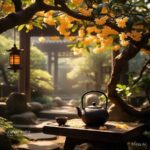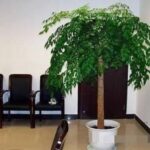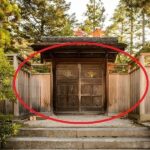The act of cutting down these trees, whether intentionally or unintentionally, is seen as removing good luck and can greatly affect the family’s prosperity. The following are four types of trees considered good luck charms in the garden, which anyone should cherish and protect if they want fortune to knock on their door.
Jackfruit tree
Jackfruit is a familiar sight in the gardens of Vietnamese households, not only for its delicious taste but also for its profound feng shui value. In folk belief, jackfruit represents abundance, family reunion, and fulfillment. A tree laden with fruits symbolizes a prosperous family with many children, all closely bonded.
The hanging clusters of fruits from the trunk downwards resemble a continuous flow of blessings passing through generations. For this reason, many families with ancient jackfruit trees consider them garden treasures, carefully preserved. Even when the tree gets old, its bark peels off, and its leaves thin out, few dare to cut it down, believing that doing so would be akin to severing the existing luck in the house.
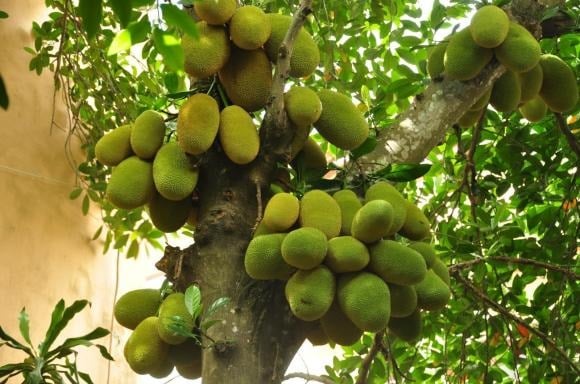
Mango tree
Not just a popular fruit tree, the mango is considered a “lucky tree” by many due to its sturdy, broad, and evergreen canopy. An old saying goes, “A house with a mango tree is a blessed one,” especially if the tree blooms at the beginning of the year or during spring, for it foretells a year of smooth sailing and prosperous business.
The older the mango tree, the more fruitful it becomes, bearing sweet and abundant yields season after season. For many families, it is not just a source of plentiful fruit but also a “blessing keeper,” attracting good fortune and prosperity. Therefore, cutting down an aged mango tree is often seen as an ill omen, disrupting the feng shui and depleting one’s fortune.
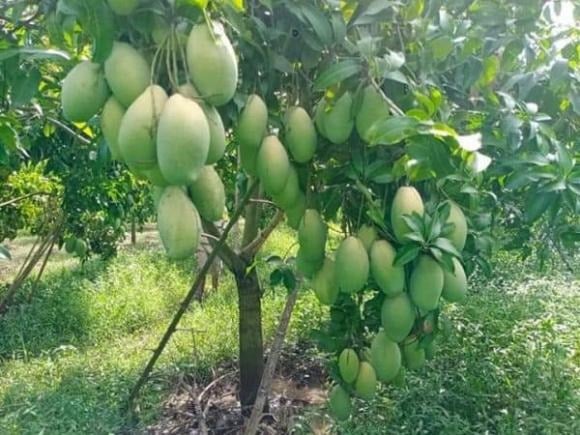
Areca palm
The areca palm has long been an integral part of traditional Vietnamese architecture. With its tall, slender, and upright stature, the palm symbolizes integrity, longevity, and nobility. Besides enhancing the landscape, the palm also helps balance the feng shui, creating a spacious and pleasant environment for the home.
According to feng shui principles, planting areca palms near the entrance attracts positive energy and brings peace and good fortune to the homeowners. The palm is also commonly present during significant events such as weddings, holidays, and ancestral worship. Therefore, cutting down an areca palm, intentionally or otherwise, is believed to disrupt the flow of good energy, potentially reducing blessings and affecting the family members’ well-being.
Pomelo tree
The pomelo tree is often likened to the “queen of fruit trees” for its round, full shape, pleasant aroma, and profound feng shui significance. The juicy, round fruit symbolizes abundance, prosperity, and financial success.
Folklore holds that if a pomelo tree blossoms towards the end of the year or near the Lunar New Year, it signifies a fortunate new year with thriving business prospects. Pomelos are also a common feature on the five-fruit tray during Tet, symbolizing wishes for abundance and peace for the family.
Long-standing pomelo trees that bear fruit consistently throughout the seasons are considered “keepers of luck and blessings.” Therefore, cutting down such a tree that has long been a part of the garden is considered a major taboo in feng shui, potentially depleting one’s fortune and affecting the family’s harmony.
Why Shouldn’t We Cut Down Lucky Trees Arbitrarily?
The four types of trees mentioned above are all long-living species with deep roots and positive feng shui energy for the home. In traditional culture, long-living trees in the garden are likened to “guardian gods,” contributing to the accumulation of positive energy, blessings, and prosperity.
Cutting down these trees is not merely a change in the landscape but can also disrupt the feng shui flow, impacting the family’s luck, health, and fortune. Therefore, if it is necessary to fell these trees, the ancients often performed rituals to ask for permission from ancestors and deities and planted new trees to maintain the vital energy of the land.
A lush garden with valuable feng shui trees not only provides a healthy living environment but also serves as a good luck charm, safeguarding family harmony, attracting wealth, and laying a foundation for the sustainable development of future generations.
The Ancient’s Wisdom: “A Home with Three Green Dragons Brings Wealth and Prosperity for Generations”
“In ancient folklore, a saying has been passed down through the generations: ‘A household with three Thanh Long trees will enjoy prosperity and wealth for generations to come.’ But what is this ‘Thanh Long’ tree, and how can planting it in a specific direction bring about such good fortune and prosperity?”
“Attract Wealth and Prosperity: The Art of Placement for Your Trash Bins”
“A trash can is not just a container for waste; it is an essential item that helps keep your living space neat and tidy. But did you know that it also holds a special significance in feng shui? That’s right; the placement and choice of your trash can can impact the flow of energy and bring good fortune into your home.”



























